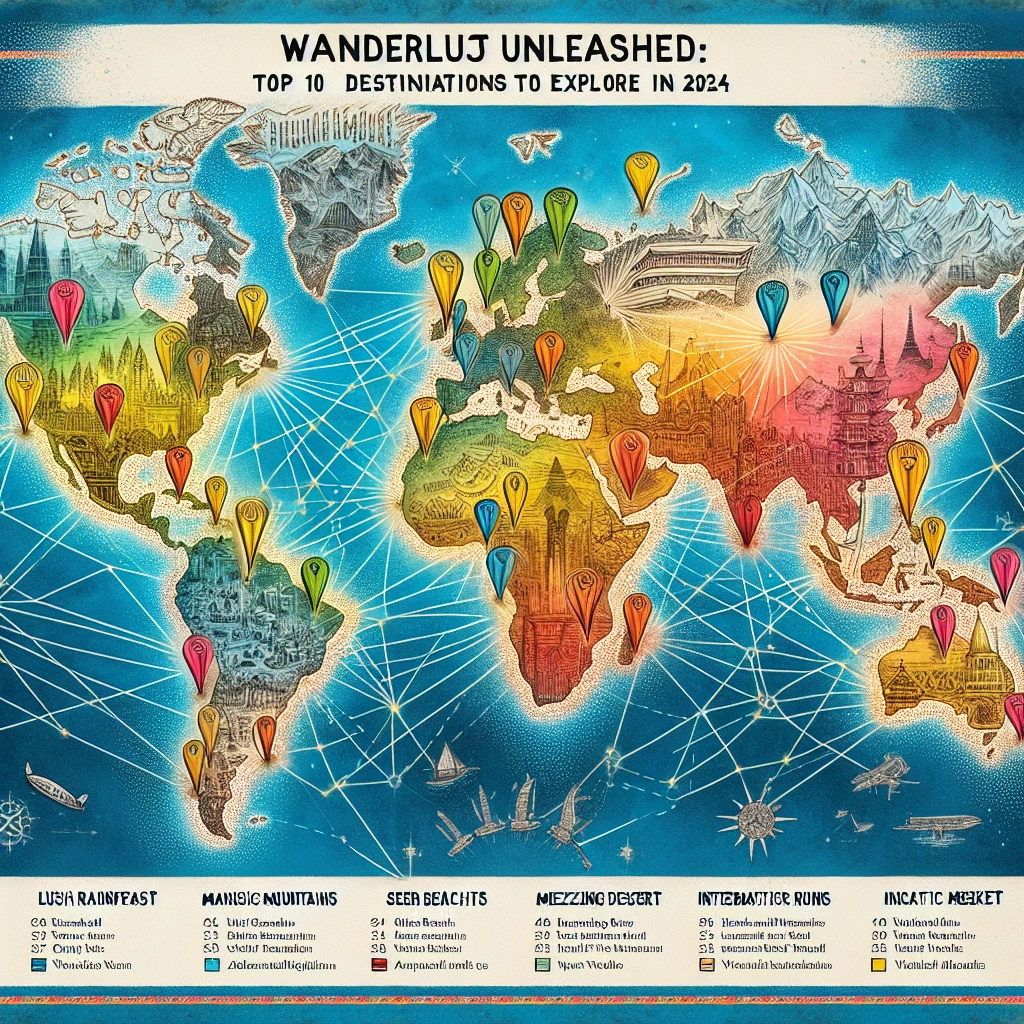[ad_1]
As the world gradually emerges from the constraints of the pandemic, travel enthusiasts are eager to reconnect with the sights and experiences that make our planet so extraordinary. However, the new age of travel is not merely a return to old ways; it presents an opportunity to embrace sustainable practices that protect our environment, preserve local cultures, and ensure that the beauty of our world remains accessible for generations to come. The mantra "Wander Wisely" embodies this mindset, encouraging explorers to travel responsibly while reaping the enriching benefits of their adventures.
Sustainable travel is no longer a niche concept but a global movement gaining traction among tourism boards, companies, and travelers alike. According to recent studies, a significant percentage of travelers express a desire to minimize their environmental footprint. Conscious travelers are choosing to support eco-friendly accommodations, local businesses, and carbon-offset initiatives, transcending the traditional notion of wanderlust. As a result, sustainable travel has moved to the forefront of the narrative, shaping the future of tourism.
Travelers now have greater access to information than ever before, making it easier to choose eco-friendly options. From boutique lodges powered by renewable energy to transportation methods such as bike-sharing or electric vehicles, sustainable travel has become increasingly accessible. Many airlines offer carbon-offset programs, allowing passengers to contribute to environmental projects that counterbalance their journey’s emissions.
When it comes to accommodations, eco-certifications like Green Globe or EarthCheck enable guests to identify hotels that prioritize sustainability. Furthermore, sustainable dining options featuring locally-produced food not only reduce food miles but also help bolster local economies. By making informed choices, travelers can tread lightly while exploring the globe.
At the heart of sustainable travel lies the importance of cultural preservation and community engagement. When travelers embrace local customs and support indigenous communities, they create a more meaningful travel experience while promoting cultural heritage. Meaningful interactions with locals enhance the narrative of a destination, allowing travelers to witness and learn about traditions that enliven each journey.
Participating in local tours and workshops not only supports artisans but also offers travelers insight into the destination’s history and challenges. By fostering relationships with local communities, travelers can contribute to their economies and help ensure that their cultural narratives are told authentically and respectfully.
Sustainable travel is closely intertwined with nature conservation. As environmental concerns grow, outdoor enthusiasts are increasingly seeking adventures that foster an appreciation for the natural world. Trekking through pristine landscapes, experiencing wildlife in its natural habitat, and participating in conservation efforts can yield unforgettable memories while promoting the importance of safeguarding ecosystems.
National parks and reserves are prioritizing sustainable tourism, implementing measures to protect local wildlife and habitats. Travelers can take part in responsible wildlife tours that are designed to minimize human impact, ensuring that the delicate balance of nature remains intact for future visitors and the species that inhabit these areas.
Emerging technologies are facilitating the transition toward sustainable travel. From apps designed to help travelers calculate their carbon footprint to platforms that promote eco-friendly accommodations, technology is simplifying the process of traveling responsibly.
Smart booking technologies are also helping destinations manage visitor traffic, easing overcrowding in popular areas and encouraging exploration of lesser-known gems. Moreover, virtual reality experiences allow people to "visit" various destinations before committing to travel, ultimately reducing unnecessary trips and promoting mindful travel experiences.
As the world adapts to the realities of climate change, the responsibility for fostering sustainable travel lies collectively with travelers, businesses, and governments. Promoting policies that prioritize sustainable tourism, investing in clean energy sources, and raising awareness about environmental issues are essential steps for creating a future where travel is sustainable and enriching for all.
The mantra "Wander Wisely" invites us to reflect on how we can travel with intention, embracing practices that benefit both ourselves and the world around us. Whether through supporting local economies, preserving cultural legacies, or protecting the environment, every traveler can play a crucial role in building a sustainable future.
As we set forth on new adventures, let us choose to wander wisely—collectively ensuring that the beauty of our diverse planet is preserved and celebrated for generations to come. With each mindful choice made, we can transform the spirit of exploration into an enduring legacy of care and respect for the world we cherish.
[ad_2]
 Top 10 Travel Apps You Need for Your Next Adventure
Top 10 Travel Apps You Need for Your Next Adventure Wanderlust Unleashed: Top 10 Destinations to Explore in 2024
Wanderlust Unleashed: Top 10 Destinations to Explore in 2024 Hidden Gems: 10 Off-the-Beaten-Path Destinations You Must Explore
Hidden Gems: 10 Off-the-Beaten-Path Destinations You Must Explore Wanderlust Awaits: Discover 15 Breathtaking Destinations Off the Beaten Path
Wanderlust Awaits: Discover 15 Breathtaking Destinations Off the Beaten Path Hidden Gems: Discover the World's Most Enigmatic Travel Destinations
Hidden Gems: Discover the World's Most Enigmatic Travel Destinations Escape to Elevation: Discovering the Magic of Mountain Getaways
Escape to Elevation: Discovering the Magic of Mountain Getaways Beyond Borders: Exploring the World's Most Enchanting UNESCO Heritage Sites
Beyond Borders: Exploring the World's Most Enchanting UNESCO Heritage Sites
I find the emphasis on sustainable travel quite refreshing. It’s about time that travelers recognize the impact their journeys have on the environment and local cultures. The idea of supporting eco-friendly accommodations and local businesses aligns with a growing awareness among tourists about their responsibilities. By choosing options that minimize our carbon footprint, we are not only benefiting ourselves through unique experiences but also contributing positively to the places we visit. This shift towards sustainability is promising for future generations who will inherit these destinations.
The article presents a compelling case for sustainable travel, highlighting its importance in today’s context. It's encouraging to see that travelers are increasingly seeking out eco-friendly options, which speaks volumes about changing attitudes toward tourism. The mention of technology's role in facilitating this transition is particularly relevant; with so many resources available, it’s easier than ever to make informed choices while traveling. I appreciate how the piece emphasizes engaging with local cultures as part of sustainable practices; this adds depth to the travel experience and fosters meaningful connections.
Sustainable travel is certainly gaining momentum, and this article captures its essence well. The call to 'Wander Wisely' resonates with me as I believe that every traveler should consider their environmental impact when exploring new places. Supporting local economies through eco-certifications and choosing green transportation options are steps we can all take to contribute positively during our travels. Moreover, the focus on cultural preservation enriches not just our own experiences but also supports communities in maintaining their heritage.
This discussion around sustainable travel is crucial as we navigate a post-pandemic world. With many people eager to return to traveling, it's important that we adopt practices that not only benefit us but also protect our planet and its diverse cultures. The insights on nature-centric adventures are particularly thought-provoking; they remind us that our natural environment deserves respect and protection as much as cultural heritage does. Engaging with local communities while being mindful of our ecological footprint should be at the forefront of every traveler’s mindset.
'Wander Wisely' is an excellent mantra for current travelers! It's not just about seeing new places but doing so responsibly. Sustainable tourism can lead to transformative experiences if approached correctly.
'Eco-certifications like Green Globe or EarthCheck provide essential guidance for those looking to make responsible choices in accommodation while traveling.'
'The rise of technology in promoting sustainable travel is promising; apps aimed at calculating carbon footprints make it easier for travelers to understand their impact.' This article rightly points out how both individuals and businesses must work together towards sustainability in tourism.
I think it's great how accessible information has become regarding eco-friendly options; planning sustainable trips no longer feels like an uphill battle.
Traveling sustainably seems daunting at first glance, yet this article provides clarity on practical ways anyone can contribute positively during their adventures—this resonates with me deeply!
The relationship between tourism and environmental conservation is crucial now more than ever; this piece effectively sheds light on how travelers can tread lightly while enjoying diverse experiences across destinations.
It's heartening to see discussions around protecting nature within tourism narratives; ensuring ecosystems thrive must remain a priority as we move forward post-pandemic—kudos for raising awareness!